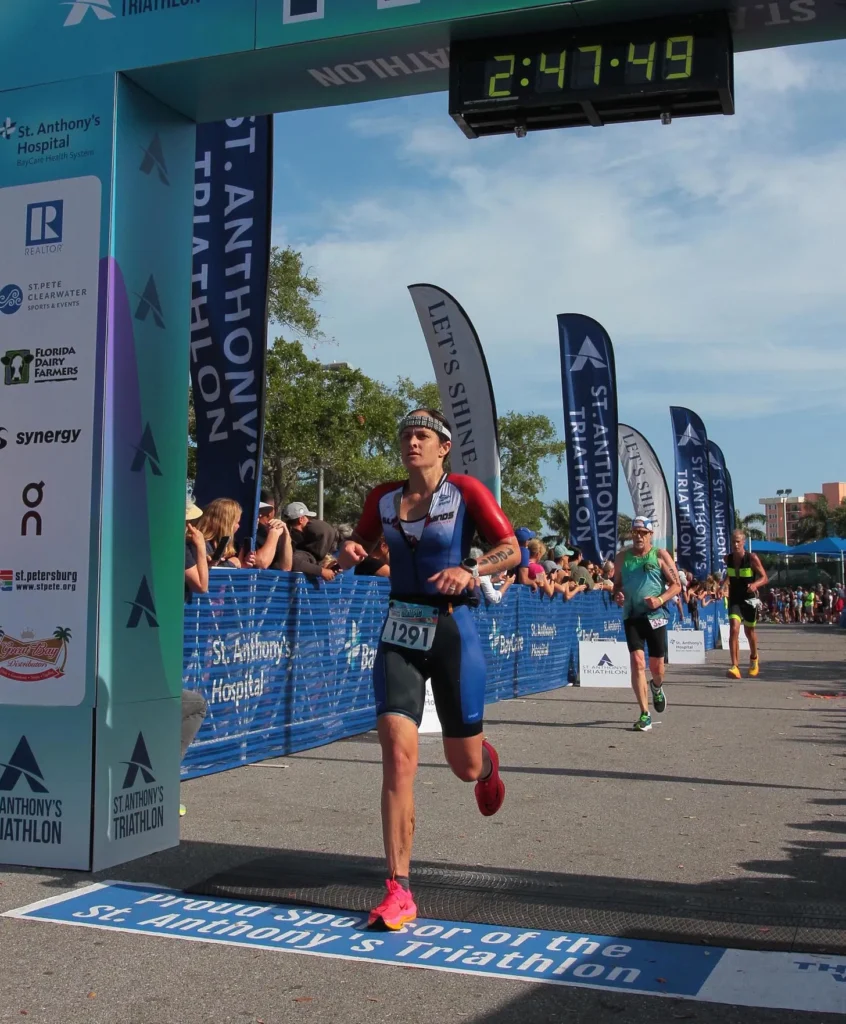
There’s an awkward, restless silence that hangs in the air during the last five seconds before the gun goes off. You can almost feel the sizzle and crackle of anticipation, excitement, and unease that seeps out of the athletes.
It’s almost as if time stands still for a split second until with a single BANG, it all comes rushing back at full speed, like you’re hurdling fast forwarded into time and space.
Then you’re in it.
Whether you’re preparing to dive into the waves during a triathlon or you’re surrounded by runners on the start line of a 10K, the emotional component of racing is undeniable.
Athletes experience a wide range of emotions during competition: excitement, anxiety, happiness, sadness, pride, disappointment, and exhilaration. We experience these emotions prior to the race, during the race itself, and after the race is finished.
Sometimes, we feel overwhelmingly positive emotions, or the more negative ones, but more often than not, we flip-flop between the good and the bad during the course of a single race. In this way, competition is quite literally an emotional rollercoaster ride.
Emotions are “mostly” within your control
I get this great newsletter once a week from Peak Performance Sports. Inside, Dr. Patrick Cohn provides a quick mental skills lesson for athletes. The topic for this week was how to manage emotions.
Here are his 6 facts about competitive emotions:
- All athletes are emotional beings.
- Emotions vary in intensity.
- Emotions affect you mentally.
- Emotions alter your physiology.
- Emotions impact your actions and performance.
- Emotions are mostly within your control.
Now most of these are pretty self-explanatory. We know that emotions can vary in intensity. For example, what bothers one person might not even phase another. We also know how strong emotions can affect our mental state, like when you’re standing on the start line with your heart beating out of your chest. But have you ever considered that emotions can affect your physiology?
Negative emotions like anxiety, frustration, and anger can wreak havoc, not only on the mind, but also the body.
Imagine this scenario. You’re at the run end of a triathlon and, for some reason, your legs have decided not to cooperate. You’re not close to your race pace, yet your heart rate is too high. You’re frustrated that your body isn’t complying with your carefully crafted race plan. You get angry, which affects your breathing, heart rate, and posture. Your technique is less fluid, you neglect your form, and your decision-making becomes compromised.
Suffice to say, the race doesn’t end well. But were the physical factors the cause of the implode, or the emotional ones? Were you angry that your body wasn’t performing well, or did you not perform well because you were angry…
In this excellent piece, Andrew Hamilton says it’s important for athletes to challenge the belief that emotions are simply reactions to external events. “In fact, the athlete has considerable capacity for control in this area,” he says.
“The difference between winners and losers often boils down to coping skills, in that some athletes have learned to cope with competitive situations better than others.”- Andrew Hamilton
Flipping the script on negative emotions
Some athletes are able to completely shut out emotions while they race. That’s not me.
I’m an emotional athlete. Don’t get me wrong, I’m great at preparing ahead of time for an event. I go through mental visualization, create a race mantra, and use positive mindset techniques.
But during a race, if my numbers don’t align with what I want them to be, I get angry. Not just a little pissed off, I mean full blown, life-is-stupid, don’t-you-dare-look-at-me, I-hate-everything anger. (Apologies if you’ve run by me during a race and seen this face.)
If you know me personally, you might think this strange because in everyday life I’m an eternal optimist. I’m positivity personified. I’m a rainbow filled with sunshine and a basketful of puppies. But if my watch says I’m running 1:00-1:30 off my race pace but my heart rate is still in zone 5, well… watch out.
Some athletes like racing angry. They can channel it into power. That doesn’t work for me.
Remember my post a few weeks ago about becoming comfortable being uncomfortable?
Analysis revealed that all athletes will feel fatigue, but “successful ones feel fatigue and happiness simultaneously.” Those who don’t cope as well with pain have a tendency to feel negative emotions, like fatigue or anger.
So I’ve been trying a little experiment. During my last few training sessions, when things start to get hard or something isn’t going well, I first try to identify the negative emotion I’m feeling. Then, I try to actively change that emotion into happiness.
And I smile.
Did you know that the simple act of smiling can trick your brain into producing happiness? It’s true. Researchers at the University of Kansas have published findingsthat show smiling helps reduce the body’s response to stress and lowers heart rate.
It might be a “fake it till you make it” kind of thing, but it doesn’t matter. The effect is the same. You can use smiling to change your mood.

How to hack your emotions
Before a competition, our body prepares by releasing epinephrine into the bloodstream which activates the “fight or flight” response. As a result, we become more focused and alert.
Elite athletes tend to interpret this physical arousal as excitement, which leads to a positive outlook on the upcoming competition. On the other hand, less confident athletes may interpret this arousal as anxiety and worry, which will have a negative impact.
Important: It’s the same physical arousal in both situations, but your interpretation of the physiological change directs your emotional response.
If you’re the type of athlete who gets nervous before a race, try this. Repeat a phrase like: “What I feel is excitement. This is my body preparing to perform.” Then, think about a past training session or race where you felt strong and powerful.
Sometimes, we feel emotions as a result of memories, conversations with other people, or seeing other competitors. A bigger trigger for many athletes is uncertainty. We don’t know exactly what’s going to happen during a race, so we feel a lack of control over the situation, which makes us feel anxious.
But that’s not exactly true. While we don’t have control over everything that happens, we do have control over our reaction to what happens. As it turns out, your reaction to an event can be infinitely more powerful than the event itself.
The key is to control what you can control and not waste energy on the things you can’t (the weather, the terrain, how other competitors might perform). Focus on your own preparation.
Here are a few strategies I use:
- Develop a routine– Whether it’s a sprinter, golfer, pitcher, or field goal kicker, elite athletes across all sports have routines that helps them focus before competition. It provides a measure of control and directs attention to important cues. Psychologist Jeff Simons popularized the Quick-Set Routine, which is something you can use in the last 30 seconds before a competition. It should include a simple physical, emotional, and focus cue. For example: Close your eyes, clear your mind, and take deep breaths (physical cue). Then, visualize yourself being successful crossing the finish line and what that feels like (emotional cue). Finally, return to the start line and think about your first action when the gun goes off. (focus cue)
- Create a pattern-breaker– A pattern-breaker is a word or phrase that’s used to shift from a negative mindset to a positive one. It could be an emotional word, like “Stop” or a directional word like “Refocus.” Other suggestions include a role model’s name, because it can help break your train of thought.
- Do a pre-race visualization– Did you know that renowned golfer, Jack Nicklaus, used mental imagery for every shot? “I never hit a shot, even in practice, without having a sharp in-focus picture of it in my head. It’s like a color movie. First, I ‘see’ the ball where I want it to finish, nice and white and sitting up high on the bright green grass.” Imagery is a powerful technique because the brain interprets imagined scenarios in much the same way that it does the events you actually experience. It can have a great impact on confidence, technique, and the ability to deal with difficulties.
- Positive affirmations– Words are powerful, especially the words we say to ourselves. Using positive affirmations over time can actually help change our belief system and help us tune out negative perceptions. For example, my positive affirmation for this week’s race is: “You are strong. You are fast. You are powerful. You are in control.”


